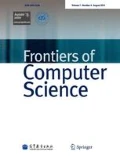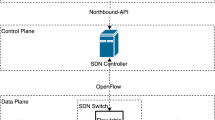Abstract
Pipeline processing is applied to multiple flow tables (MFT) in the switch of software-defined network (SDN) to increase the throughput of the flows. However, the processing time of each flow increases as the size or number of flow tables gets larger. In this paper we propose a novel approach called PopFlow where a table keeping popular flow entries is located up front in the pipeline, and an express path is provided for the flow matching the table. A Markov model is employed for the selection of popular entries considering the match latency and match frequency, and Queuing theory is used to model the flow processing time of the existing MFT-based schemes and the proposed scheme. Computer simulation reveals that the proposed scheme substantially reduces the flow processing time compared to the existing schemes, and the difference gets more significant as the flow arrival rate increases.
Similar content being viewed by others
References
Aggarwal C, Srivastava K. Securing IOT devices using SDN and edge computing. In: Proceedings of the 2nd International Conference on Next Generation Computing Technologies. 2016, 877–882
Open Networking Foundation. Openflow switch specification. Version 1.3.1, 2012
McKeown N, Anderson T, Balakrishnan H, Parulkar G, Peterson L, Rexford J, Shenker S, Turner J. OpenFlow: enabling innovation in campus networks. ACM SIGCOMM Computer Communication Review, 2008, 38(2): 69–74
Kreutz D, Ramos F, Verissimo P, Rothenberg C, Azodolmolky S, Uhlig S. Software-defined networking: a comprehensive survey. Proceedings of the IEEE, 2015, 103(1): 14–76
Open Networking Foundation. The benefits of multiple flow tables and ttps. Version 1.0, 2015
Zhang H, Yan J. Performance of SDN routing in comparison with legacy routing protocols. In: Proceedings of 2015 International Conference on Cyber-Enabled Distributed Computing and Knowledge Discovery. 2015, 491–494
Kotronis V, Dimitropoulos X, Ager B. Outsourcing the routing control logic: better internet routing based on SDN principles. In: Proceedings of the 11th ACM Workshop on Hot Topics in Networks. 2012, 55–60
Long H, Shen Y, Guo M, Tang F. LABERIO: dynamic load-balanced routing in OpenFlow-enabled networks. In: Proceedings of the 27th IEEE International Conference on Advanced Information Networking and Applications. 2013, 290–297
Mao Q, Shen W. A load balancing method based on SDN. In: Proceedings of the 7th International Conference on Measuring Technology and Mechatronics Automation. 2015, 18–21
Reitblatt M, Canini M, Guha A, Foster N. Fattire: declarative fault tolerance for software-defined networks. In: Proceedings of the 2nd ACM SIGCOMM Workshop on Hot Topics in Software Defined Networking. 2013, 109–114
Kim H, Schlansker M, Santos J, Tourrilhes J, Turner Y, Feamster N. Coronet: fault tolerance for software defined networks. In: Proceedings of the 20th IEEE International Conference on Network Protocols. 2012, 1–2
Guerzoni R, Trivisonno R, Vaishnavi I, Despotovic Z, Hecker A, Beker S, Soldani D. A novel approach to virtual networks embedding for SDN management and orchestration. In: Proceedings of 2014 IEEE Network Operations and Management Symposium. 2014, 1–7
Li D, Wang S, Zhu K, Xia S. A survey of network update in SDN. Frontiers of Computer Science, 2017, 11(1): 4–12
Wu Z, Jiang Y, Yang S. An efficiency pipeline processing approach for OpenFlow switch. In: Proceedings of the 41st IEEE Conference on Local Computer Networks. 2016, 204–207
Ozcevik Y, Erel M, Canberk B. Spatio-temporal multi-stage OpenFlow switch model for software defined cellular networks. In: Proceedings of the 82nd IEEE Vehicular Technology Conference, 2015, 1–5
Kanizo Y, Hay D, Keslassy I. Palette: distributing tables in software-defined networks. In: Proceedings of IEEE INFOCOM. 2013, 545–549
Kang N, Liu Z, Rexford J, Walker D. Optimizing the one big switch abstraction in software-defined networks. In: Proceedings of the 9th ACM Conference on Emerging Networking Experiments and Technologies. 2013, 13–24
Yu M, Rexford J, Freedman M, Wang J. Scalable flow-based networking with DIFANE. In: Proceedings of ACM SIGCOMM Computer Communication Review. 2011, 351–362
Wang Y, Tai D, Zhang T, Jin L, Dai H, Liu B, Wu X. Flowshadow: a fast path for uninterrupted packet processing in sdn switches. In: Proceedings of the 11th ACM/IEEE Symposium on Architectures for Networking and Communications Systems. 2015, 205–206
Wang Y, Tai D, Zhang T, Liu B. FlowShadow: keeping update consistency in software-based OpenFlow switches. In: Proceedings of the 24th IEEE/ACM International Symposium on Quality of Service. 2016, 1–10
Kannan K, Banerjee S. Flowmaster: early eviction of dead flow on SDN switches. In: Proceedings of International Conference on Distributed Computing and Networking. 2014, 484–498
Adan I, Resing J. Queueing theory. See Wikipedia, 2002
Acknowledgements
This work was partly supported by Institute for Information & communications Technology Promotion (IITP) grant funded by the Korea government (MSIT) (2016-0-00133, Research on Edge computing via collective intelligence of hyperconnection IoT nodes), Korea, under the National Program for Excellence in SW supervised by the IITP (Institute for Information & communications Technology Promotion) (2015-0-00914), Basic Science Research Program through the National Research Foundation of Korea (NRF) funded by the Ministry of Education, Science and Technology (2016R1A6A3A11931385, Research of key technologies based on software defined wireless sensor network for realtime public safety service, 2017R1A2B2009095, Research on SDN-based WSN Supporting Real-time Stream Data Processing and Multi-connectivity, 2019R1I1A1A01058780, Efficient Management of SDN-based Wireless Sensor Network Using Machine Learning Technique), the second Brain Korea 21 PLUS project.
Author information
Authors and Affiliations
Corresponding author
Additional information
Cheng Wang received the MS degree in College of Computer Software Engineering from Hanyang University, Korea in 2015. He is currently working toward the PhD degree in College of Electrical and Computer Engineering in Sungkyunkwan University and research staff of Ubiquitous computing Technology Research Institute. His current research interests include Internet of Things technology, wireless networks, software defined networks and machine learning.
Kyung Tae Kim received the PhD degree in College of Information and Communication Engineering from Sungkyunkwan University, Korea in 2013. He is currently a research professor at the college of software from Sungkyunkwan University, Korea. His current research interests include ubiquitous computing, wireless networks, and Internet of Things technology.
Hee Yong Youn received the BS and MS degree in electrical engineering from Seoul National University, Korea in 1977 and 1979, respectively, and the PhD degree in computer engineering from the University of Massachusetts at Amherst, USA in 1988. He had been Associate Professor of Department of Computer Science and Engineering, The University of Texas at Arlington until 1999. He is Professor of College of Software, and Director of Ubiquitous Computing Technology Research Institute, Sungkyunkwan University, Suwon, Korea. His research interests include mobile and ubiquitous computing, intelligent IoT and edge computing, and distributed machine learning. He has published numerous papers in reputed journals and conferences, and received Outstanding Paper Award from the 1988 IEEE International Conference on Distributed Computing Systems, 1992 Supercomputing, IEEE 2012 International Conference on Computer, Information and Telecommunication Systems, and CyberC 2014. Prof. Youn has been General Co-Chair of IEEE PRDC 2001, International Conference on Ubiquitous Computing Systems (UCS) in 2006 and 2009, UbiComp 2008, CyberC 2010, Program Chair of PDCS 2003 and UCS 2007, respectively.
Electronic Supplementary Material
Rights and permissions
About this article
Cite this article
Wang, C., Kim, K.T. & Youn, H.Y. PopFlow: a novel flow management scheme for SDN switch of multiple flow tables based on flow popularity. Front. Comput. Sci. 14, 146505 (2020). https://doi.org/10.1007/s11704-019-8417-5
Received:
Accepted:
Published:
DOI: https://doi.org/10.1007/s11704-019-8417-5



